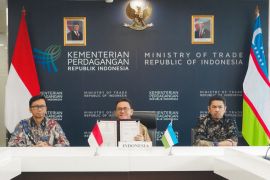Some 30 to 50 people die daily from drug abuse, Coordinating Minister for Political, Legal and Security Affairs Luhut Binsar Panjaitan revealed in Bandung, West Java March 18.
"Drug abuse in Indonesia is worse than terrorism," the minister said, adding that the number of drug users has reached 5.9 million in the country.
The country has 4.5 million drug addicts who need rehabilitation. Some 1.2 million drug addicts are in such dire straits that even rehabilitation is no longer an option for them.
Nearly 75 percent of those convicted for drug trafficking still manage their businesses from jails, he affirmed.
Despite the governments serious fight against illicit drugs, the number of drug-related cases had increased 13 percent in 2015 compared to the previous year.
"This is recorded as the highest surge in the last five years. The increase in methamphetamine usage reached 350 percent and ecstasy 280 percent, which is very dangerous," Pandjaitan pointed out.
Indonesia is one of the few countries that have the harshest drug laws in the world.
In 2015, the Attorney Generals Office had executed 14 death row inmates.
On January 18, 2015, six death row inmates were executed in Nusakamangan and the Mobile Brigade Headquarters in Boyolali, Central Java.
The six were Tommi Wijaya (the Netherlands), Rani Andriani (Indonesia), Namaona Denis (Malawi), and Marcho Archer Cardoso Moreira (Brazil), in addition to Tran Thi Bich Hanh (Vietnam), and Daniel Enemuo alias Diarrsaouba (Nigeria).
On April 29, eight death row inmates were executed. They were Rodrigo Gularte (Brazil), Sylvester Obiekwe Nwolise (Nigeria), Okwudili Oyatanze (Nigeria), Martin Anderson alias Belo (Ghana), and MGS Zainal Abidin bin MGS Mahmud Badarudin (Indonesia), in addition to Rahem Agbaje Salami Cardova (Cardova), Myuran Sukumaran (Australia), and Andrew Chan (Australia).
Further executions of drug offenders are just a matter of time, and likely this year, Attorney General HM Prasetyo has affirmed.
"Just observe the implementation later. It is just a matter of time," he stated March 18.
He had never spoken of executions being discontinued, Prasetyo clarified.
The authorities have not bowed to pressure from other countries which have wanted the executions discontinued, he affirmed.
"There is nothing like that. Our legal enforcement lies in the hands of our own state, and death penalty is still applied in line with Indonesias positive legal system," he remarked.
No party in Indonesia or outside can dictate to the country on the issue of execution of drug convicts, Minister Luhut Pandjaitan also stated.
However, if the drug convicts on death row have not been executed, it is only matter of time, because it was not found appropriate for the law enforcement to do so, he told the press.
"It is only a matter of time," Pandjaitan said when questioned about the governments war on drugs.
The execution of the drug convicts on death row has not yet been carried out, considering the economic stability aspect of the country, the minister noted.
The National Anti-Narcotics Agency (BNN) expressed its support for the governments decision to execute drug-related death row prisoners.
Indonesia has declared a zero-tolerance stance on drugs, particularly drug traffickers and syndicates, Indonesian Ambassador and Permanent Representative to the United Nations and other International Organizations in Vienna Rachmat Budiman has said.
The ambassador made the statement while speaking at the 59th Session of the Commission on Narcotic Drugs (CND) held in Vienna, Austria, recently.
Drug production, smuggling and drug abuse pose a serious threat to Indonesia as such things affect the countrys economic and social life, Budiman said.
Drug traffickers and syndicates have been targeting Indonesia and their networks have spread across the country targeting the younger generation, he remarked.
Therefore, the government is determined to enforce laws firmly against drug criminals, he said.
The ambassador called on other countries to respect the territorial integrity and sovereignty of Indonesia in its efforts to fight drug-related crimes.
Indonesia is, in fact, applying a new paradigm through a balanced approach between legal enforcement and rehabilitation programs for drug addicts, Budiman noted.
Early last year, President Joko Widodo (Jokowi) symbolically officiated at a groundbreaking ceremony of drug rehabilitation centers in seven Indonesian cities as an assurance to reach the target of rehabilitating 200,000 drug addicts in 2016.
"In 2014, 18,000 drug addicts were rehabilitated, while in 2015, we target an increase in the figure to 100,000, and in 2016 it should reach 200,000. We should double the number, as the number of addicts continues to increase," Jokowi remarked.
The rehabilitation centers located in South Sumatra, East Java, Jambi, and West Kalimantan, apart from South Kalimantan, North Sulawesi, and North Maluku, are managed by the Social Affairs Ministry. ***4***
(f001/INE/o001)
19-03-2016 13:52:39
Reporter: Fardah
Editor: Fardah Assegaf
Copyright © ANTARA 2016











